Modern lifestyles in cities often see most of us buying more, despite the acclaimed ‘Refuse, Reuse, Reduce, Repurpose and Recycle’ mantra. When tired of the clutter, we repurpose pre-owned belongings like old clothes and toys by passing them on to domestic help. But, a step further could help support underprivileged communities throughout the country. There are many organisations in Mumbai supporting local communities in need by distributing pre-owned items in the city and rural Maharashtra.
“We can’t say we’re solving the poverty crisis, but there’s a need and we’re filling it,” says Pradeep Tripathi, founder of Green Yatra, a foundation rooted in sustainability practices.
Hailing from a small village in Madhya Pradesh, Pradeep comes from first-hand experience in how everyday necessities can take up most of your income. Green Yatra has set up centres across rural Maharashtra, where donations collected from Mumbai travel to reach families who, themselves, travel 10 km to the pickup centres in anticipation. He says donation is often seen just as charity, but in helping those in need, as a society, we’re also contributing to what should be a natural sustainability process, especially in face of rising amounts of waste in Mumbai.
Read more: The state of urban planning in Mumbai: A discussion
Estimates by the Central Pollution Control Board (CPCB) in 2019 claimed that Delhi and Mumbai were among the top two cities to generate solid waste. Per day Mumbai was found to generate 11,000 tonnes. Currently, sewage in the city is treated at eight sewage treatment plants (STPs) divided amongst seven geographical zones. But gaps in sewage generated and treated in the city is dangerous since untreated sewage is often discarded into water bodies, carrying pollutants that are hazardous to citizens’ health as well as Mumbai’s vulnerable environment. It becomes necessary, then, to engage in sustainability practices that are not only environmental but could potentially help the economic growth of several families.

Where you can donate in Mumbai
Several private interventions in the form of Non-Governmental Organisations (NGOs), entrepreneurs and trusts have started donation centres/initiatives. Like Green Yatra, many handle the transportation of goods to communities. Some even organise pickups at your doorstep, making the process easier.
| Organisation | Items accepted* | Contact info |
|---|---|---|
| Share At Door Step India | Shoes, stationary, bags, clothes, furniture | Website: sadsindia.org tel: 8884784742 |
| Snehasadan Mumbai | Eatables, groceries, toiletries, study materials, clothes, gifts/toys, computers, utensils, furniture, electrical items | tel: 022 -26873694 , 022 – 26872945 |
| Green Yatra | Clothes, utensils, electrical appliances (washing machine, laptop, mobile, computer etc.) bed sheets, toys, blankets, shoes, sporting goods, furniture, stationery, books. | tel: 99675 38049 |
| Goonj | Clothes, footwear, dry rations | tel: Himanshu (8287971374), Ankita (8287969735, 9082884374) |
| Ratna Nidhi Charitable Trust | Clothes, books, toys | tel: 8530485324 |
*new or pre-owned but usable
- Share At Door Step India
A for-profit venture, Share At Door Step (SADS) “provides cause-related marketing solutions to companies, supports Corporate Social Responsibility (CSR) related activities, and provides doorstep donation services to individuals and corporate donors.” Started by Anushka Jain, SADS allows users on their website to choose their location, after which, the website will present them with information on different organisations that they partner with. On finding a match, a user can then schedule a pickup. Donations are then delivered to respective NGOs.
- Snehasadan, Mumbai
Snehasadan is a home for street children in Mumbai. Over 49 years, the organisation has given shelter to children who run away or are orphaned. Located behind Holy Family Church, Andheri East, Sneha Sadan first began in a makeshift hut in Chakala, with five boys who ran away on their first night. It is now a well-established organisation helping young children move through education and a dignified livelihood.
They accept both monetary and pre-owned donations, the latter has to be delivered directly to the address.
- Green Yatra
Rooted in environmental justice, Green Yatra began in 2008 to respond environmentally to plastic wastage caused during Ganesh Puja. They initiated the ‘Go Green Ganesha Project’ to sensitise young children towards alternative methods of celebration. Apart from other projects, led by Corporate Social Responsibility (CSR) funds, they now facilitate regular donations to rural parts of Maharashtra.
Donations can be made directly to their office in Bhayandar (East), Thane. They specify that donations be in good condition and usable.
- Goonj
Goonj aims to involve underprivileged communities in solutions towards issues of poverty and dignity. Some of their initiatives include using old material as resources for different rural development projects, addressing educational needs of rural children, sanitation and access to water. They have drop-off centres across the country for donations of pre-owned belongings, and in Mumbai, donations can be made at their East Thane centre.
More information is available on their website.
This explainer is part of a series on ‘Explainers and Information Resources for Mumbaikars’ supported by a grant from the A.T.E. Chandra Foundation.